The Resume of a Legend
Now that the Super Bowl dust has finally settled, Brady’s claim is clear—he is the greatest to ever play the game.
By Miguel Robles, University of Colorado Denver
We often define greatness in sports as someone who stands larger than life, a person who acts as a linchpin for their game, an athlete who has reached the pinnacle of competitive achievement.
To be the greatest ever, though? That requires a much different standard.
The “greatest” transcends all time and space in the sporting world. Their accomplishments and impact seem so vast that it would take a herculean effort to even come within sniffing distance. To be crowned the greatest, a star is morphed into a legend, impervious to the decay of time. The title of the greatest isn’t thrown around lightly, with names like Jordan, Ali, Gretzky, Nicklaus and Pele sitting on the mantle.
On a fateful February night, following a spectacle of epic proportions, Tom Brady cemented his status (as if it wasn’t clear already) as unquestionably the greatest quarterback, hell the greatest football player, who’s ever suited up for the gridiron.
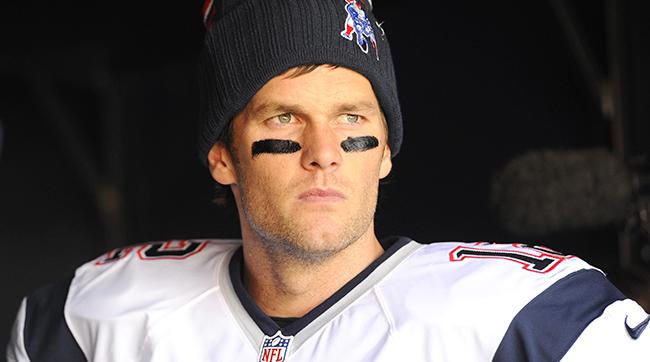
Before we go any further however, let me make this clear: I have hated Tom Brady since I was old enough to understand the strange game of football.
I hate Tom Brady more than any sports figure I’ve ever had room to despise. I hate the fact that he used to always beat the living shit out of my Broncos. I hate how he’s been implicated in multiple “cheating” scandals. I hate how whiney he acts anytime anyone breathes in his direction. I hate how he remains blissfully ignorant to the entire political realm.
But, more than anything, I hate him because he’s so goddamn perfect. Super Bowl LI shattered the will of Brady-haters across the country, as the “Golden Boy” reached new heights in an unimaginable career.
The Formation of Tom Terrific
Brady didn’t enter the NFL through the same door as Manning, Elway, Marino or many of the other greats. He wasn’t “destined” for success as some of the other Hall of Famers. Most great quarterbacks are anointed from the draft class onward, ostensibly carrying the torch of legendary quarterbacks everywhere.
Of the thirty-three quarterbacks whose names are in the Hall of Fame, fourteen of them (42 percent) were drafted in the first round, and three future Hall of Famers (Ben Roethlisberger, Peyton Manning, Aaron Rodgers) were also drafted on the first night, in the first round.
Unlike them, Brady snuck in the backdoor of the league, overlooked, unwanted and almost undrafted.
Brady’s story began in the 2000 draft. An anemic combine performance, paired with the fact that the dude looked like your plumber at the time, caused most teams to overlook Brady. The Patriots, one of the only teams high on Brady, selected him as the 199th pick in the sixth round.
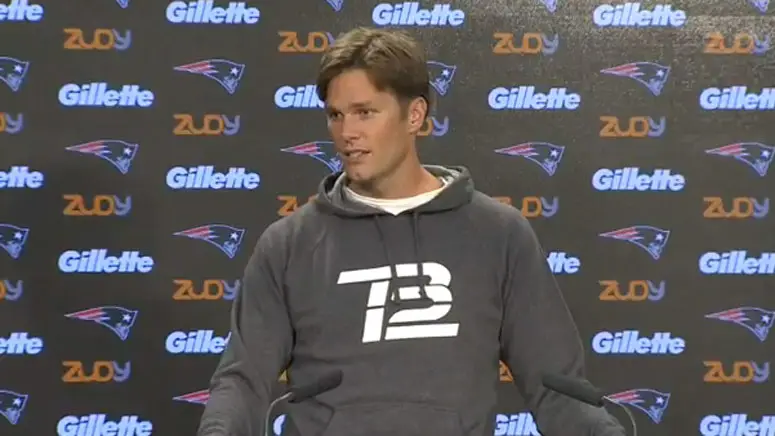
Highlighting how little Brady was regarded as a position prospect, six quarterbacks were taken before the Golden Boy. Who could forget the world-beaters of Giovanni Carmazzi (3rd round, 65th overall), Chris Redman (3rd round, 75th overall), Tee Martin (5th round, 163rd overall) and Spregon Wynn (6th round, 183rd overall), who combined for a total of fifteen starts?
The other two quarterbacks drafted before Brady, Chad Pennington (1st round, 18th overall) and Marc Bulger (6th round, 168th overall), did end up having decent careers, though their combined 224 touchdowns is less than half of Brady’s 456. Brady could have easily changed the fortunes of the teams who passed on him (Jets, 49ers, Ravens, Steelers, Saints and Browns), but the draft snub wasn’t the first time he was overlooked.
Brady had mixed reviews coming out of high school, as many big name schools questioned whether or not he could hold up under the bright lights. In the end, Brady ended up committing to Michigan. The first two years were incredibly frustrating for Brady, as he rode the bench behind Brian Griese and Scott Driesbach, to the point where he considered transferring to hometown University of California. However, his commitment paid off his junior year, when he finally got a shot at the starting gig.
Brady had a solid season, setting school records for completions and attempts in a single season. The honeymoon wouldn’t last though. In Brady’s senior year, Drew Hanson, the freshman thought to be a two-sport phenom in baseball and football, ended up playing more minutes than the senior.
After the draft, Brady entered camp as the Patriots fourth-string quarterback, a position that usually leads to being cut before the regular season (especially if you’re a lowly regarded rookie).
For someone like Brady, greatness may stem from those slights—being constantly overlooked, told he would never be good enough. Brady is certainly someone who has feasted on doubts and challenges to his legend.
Audiences saw it in 2016, in which Brady had arguably his best season ever, despite missing four games in the wake of Deflategate. No one had more to prove after the scandal dragged his reputation through the mud, but his performance put the NFL and Roger Goodell on notice; if you go after the bull, you get the horns.
Brady channeled that rage to rise up the ranks to backup quarterback, playing behind the franchise quarterback, Drew Bledsoe. It wasn’t until Brady’s second year however, that the legend of the Golden Boy was born.
Brady’s stroke of luck in the 2001 season almost seems anticlimactic. On a September day, playing against the Jets in Foxboro, Brady got his first exposure, after Bledsoe was pummeled by Mo Lewis scrambling for a first-down. It’s fair to say at this point that sheer force of will wouldn’t have been enough to knock Drew Bledsoe, a Pro Bowler, entering his prime, from his starting spot; no, it took a gruesome injury to give Brady a chance. Who knew that one play would forever change the power structure of the NFL? The rest, as they say, was history.
Bledsoe never played another snap in New England. The chest injury he sustained in the Jets game ruled him out for the year. He was traded the next season to the Jets.
Brady, on the other hand, led the Patriots to an 11-5 record, including a win over fellow young phenom, Peyton Manning. In the playoffs, after the infamous tuck rule in the divisional round, and Vinatieri’s heroics, Brady had emphatically entered the league’s consciousness, standing as a Super Bowl champion.
A Place Amongst the Giants
NFL quarterbacks, fairly or not, are inevitably judged on their Super Bowl success. It’s why Dan Marino, despite his gaudy stats, has never received honest consideration for his claim as the greatest. For Peyton Manning, despite having regular season stats that may never be surpassed, his winning only two Super Bowls has left an incriminating mark on his GOAT resume. Peyton’s regular-season success was incomprehensible, but his post-season success was sub-par.
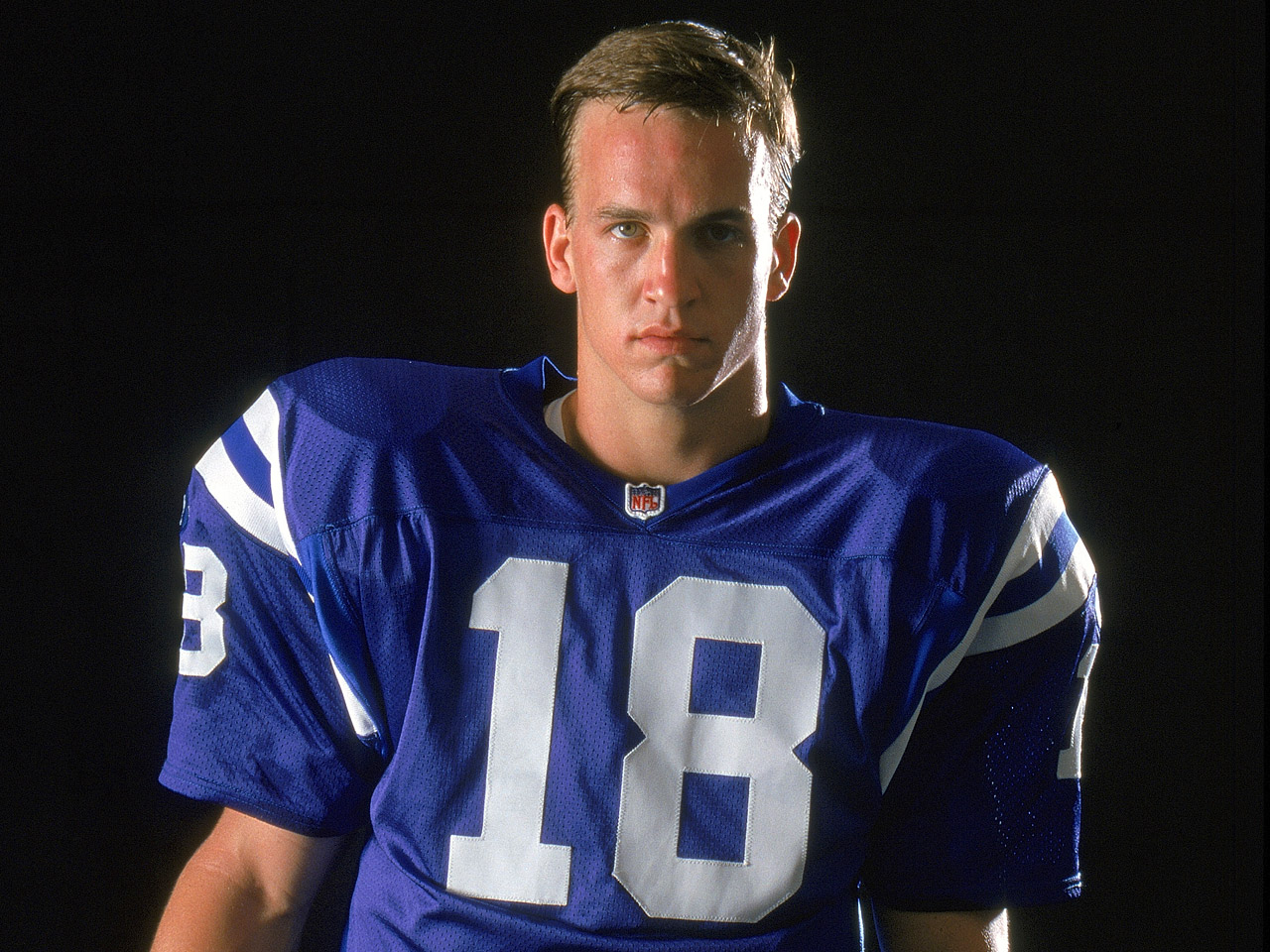
But, merely winning championships is not a strong enough criteria to be considered the greatest, otherwise we might be hearing Terry Bradshaw and his four rings as a strong candidate. Bradshaw, while undoubtedly great, had the benefit of the Steel Curtain, Lynn Swann, Franco Harris and John Stallworth, arguably one of the greatest dynasties of all time. All Bradshaw had to do was not fuck it up.
Joe Montana, on the other hand, was the guy. Despite having a loaded team, Montana led his team to four Super Bowl victories. While his stats were often mediocre, 17th all-time in pass yardage, 16th all-time in pass completions and touchdowns, his clutch ability and post-season dominance was second to none. This is why Montana has been seen as the gold standard and arguably the greatest quarterback for years.
Brady is a different beast all together. He’ll never be counted down for mediocre regular season stats. While Peyton and Favre’s stats may leave a mountain too steep to climb at the top, Brady ranks 4th in both passing yards (61,582), completions (5,244) and touchdowns (456).
What separates Brady from the pack though, is his nearly perfect playoff performance. He’s tops in passing yards, pass completions, touchdown passes and wins in the playoffs, with the most passing yards, touchdown passes, appearances and wins in the Super Bowl. Yep, that’s one hell of a resume.
Most importantly, he’s not done. Despite having his 40th birthday next season, 2016 showed fans that he isn’t slowing down any time soon. As history has shown, the moment you count Brady out, you’ve already lost.


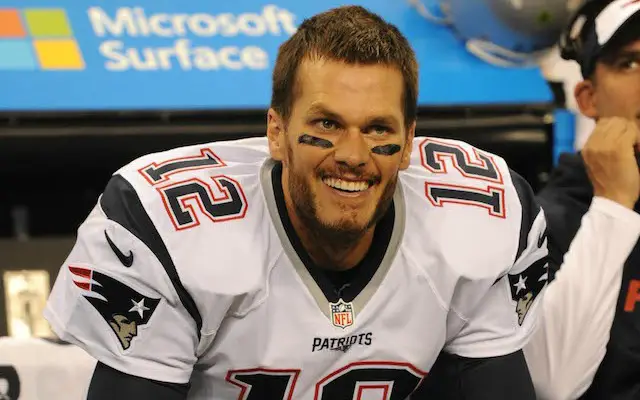


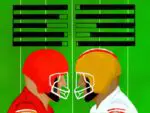









Well done. By and large, Broncos fans have shown an almost irrational hatred of Brady (as have NY, Pgh, Indy, Baltimore, etc…). But it has to be acknowledged; it’s recognizing true greatness that brings about that type of emotion.
As my brother pointed out the other day, In Tom Brady’s sixth most successful season the Patriots went 18-1 and he threw 50 TD passes. Sixth.
GOAT.
Best that can be said of Brady is that he’s the GOAT of his era. Montana played until 34 for the 49ers and won 4 Super Bowls. Brady played until 39 in an easier era for QBs and won 5. Statistically no better. Plus Montana had to play against the 80s Bears, Redskins, and Belichick Giants. Brady played for Belichick and never against an opponent that strong. Montana has one of the highest playoff QB ratings ever, Brady is 15th.
Just a fact check. Bledsoe did come back that year. He wasn’t ruled out for the season. But by the time he did come back, Brady had taken the starting job.
I’d also add that Bledsoe helped lead the Patriots to victory in the AFC Championship game when Brady went down with an ankle injury that year.
A few things-Bledsoe did play again in 2000, that season in the playoffs when Brady hurt his ankle. Bledsoe never played for the Jets-he played for the Cowboys and Bills after that. And to Mr. Kalyn’s points- there were no 80’s Bears-there were the ’85 Bears; that was a one off team who put one run together-they were very beatable from 80-83 and 87-90. As for Montana’s passer rating-he’s #6 at 95.6-Brady IS 13th, but you know else is above Brady? Matt Ryan, Tony Romo, Alex Smith and Mark Sanchez, so how meaningless is that stat? Brady played head to head against Peyton almost every year, the Ed Reed-Ray Lewis Ravens, and Big Ben’s 2 ring Steelers as well.
Montana played 15 years. Brady’s in his 17th, but did not start in Year One and missed 2008-so Brady won 5 rings in 15 years, Montana won 4. When Brady walks away in 2-3 more seasons, he will lead virtually every regular season, playoff and Super Bowl passing statistic list, and have the most regular season wins, the most playoff wins and the most Super Bowl wins. Name one other player in any sport who has accomplished this. Answer-NO ONE.
Nice article, but you got one fact wrong. Drew did play again for the Patriots after he was injured. Brady got injured and missed one game, Drew replaced him and won the game. Some people thought Drew should get his job back for the playoffs, but Belechick stuck with Brady and the rest is history.
Great article. Very well written. Two quick clarifications: Bledsoe did play a few more snaps in the AFC championship game against the Steelers (and threw a touchdown pass) after Brady sprained his ankle. Finally, Bledsoe was traded to the Bills not the Jets. Otherwise…well done Miguel!!!
Decent article, but you may want to check your facts in the future. Drew Bledsoe wasn’t done for the year, and he did take more snaps for New England. In the AFC title game, Brady got hurt and Bledsoe subbed in and scored a touchdown. Also, Bledsoe was traded to the Bills, not the Jets.
A good overall article but the author is mistaken when he said Bledsoe never played another snap after he was injured and Brady took over. Bledsoe did indeed take some snaps the season Brady took over in 2001. Bledsoe took a lot of snaps as a matter of fact in the AFC Championship game against the Steelers and finished with the win after Brady was hurt early in the game. Of course Brady took over the quarterback position again in the Super Bowl against the Rams and his legend began.
There are numerous incorrect facts, on top of what was provided already, you should really fact check, this is bordering on ‘false news’: 1) Brady has not repeatedly beat down on Denver, Broncos are the only team that has winning record. 2) Drew Henson did not get more play time than Brady in his senior year…. they spilt time until it was clear that Brady was better, and Brady got all the starts eventually including Rose Bowl victory over Alabama.
Love Joe, but you can’t discredit Tom because he played longer. Means he was able to do it longer and keep going. Brady sat out one year so he has made it to the SB almost 50% of his 15 year career !! That is rediculas. Winning superbowls over 15 years apart with completely different players, but one constant…HIM. Era not easier. Heard of free agency? or Seahawks, Ravens, Steelers D? Outside of Moss 2 years(who he set records with) name Brady’s receivers and RB’s over the years and other Hall of Fame players? Joe played with multiple HOFers on both sides of the ball….one comes to mind ..oh yeah..Jerry Rice the greatest receiver of all time. TB12=GOAT The argument is over. Move on.
It was the orange bowl
Brady has won 7 of the last 10 matchups against Denver and 6 were in blowout fashion. The games that Denver won, early in Brady’s career, were mostly contested 1 score games. Get your facts straight.